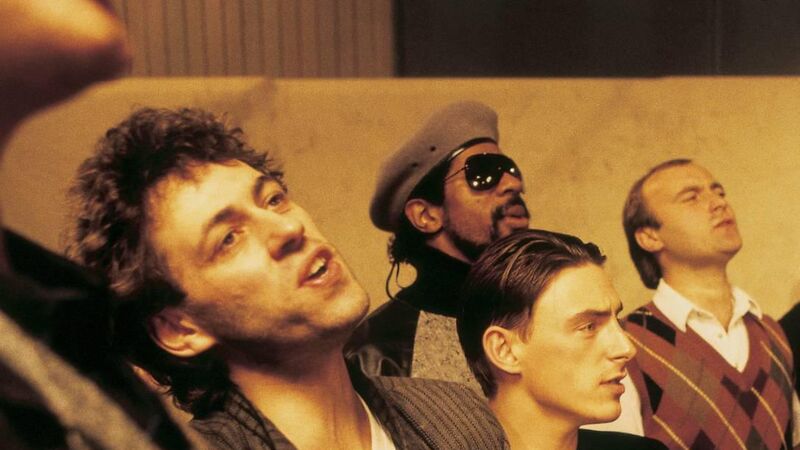Why I’m right to criticise Band Aid hit song

Bob Geldof among other stars recording Do They Know It’s Christmas? in November, 1984
Your features editor John Dolan wrote an article entitled ‘Oh dear, Geldof’s Band Aid hit is in danger of being cancelled’ (Nov 23), in which he stood up for Bob Geldof, and was scathing of my own recent article criticising Band Aid, and to which Geldof had responded in his familiarly crude way.
I too will be to the point then.
Mr Dolan’s article spoke of me as though I was a misinformed moron who had simply got it wrong. On the contrary, I have spent almost my entire career examining debates about political and economic power and the role of promotional communications within the non-profit sector.
I found his ‘dearie me’ comment in relation to my article about the song Do They Know It’s Christmas? to be particularly patronising and irksome.
Before I go any further then, I want to thank John and The Echo for inviting me to write this response because journalism should be a space for public debate and for holding the powerful to account. At this moment, most other mainstream news media are giving a plentiful platform to Band Aid advocates and placing those who disagree on the margins as supposedly ‘radical’ thinkers.
As the philosopher Neil Levy said of the public attacks upon scholars who try to raise important questions and scrutinise the charity sector: “Even to contemplate opposition seems to convict one of misanthropy or worse.”
Unfortunately, in this instance, Mr Dolan is very much against the tide of both modern and ancient research on the subject.
He claims that “in the famine-hit Ethiopia of 1984, nothing did grow and no rains did flow”, in reference to the controversial lyrics to the song. This is simply not true as Ethiopia is on the whole a very fertile country.
Columbia University Professor Saskia Sassen’s work focuses on the millions of ‘micro-expulsions’ that have occurred around the Global South as small hold farmers have been moved from their traditional lands in the postcolonial era to make way for the large monocrop plantations of multinational corporations. This food is grown to feed us.
More broadly, Professor Alex de Waal of Tufts University, states clearly that famines are crimes against humanity. However, they don’t carry the same public understanding as genocide or ethnic cleansing. Those who die in a famine - not usually from starvation itself but from the diseases associated with malnutrition - do so because they have been disenfranchised.
Indeed, the story of Ireland’s own historical trauma of famine during the 1840s should inform readers’ understanding. Irish colonial subjects died, or were forced to emigrate, surrounded by food that they were not entitled to and risked imprisonment if they stole.
Perhaps we should take a moment to commend The Dubliners for their accurate portrayal of that situation in The Fields Of Athenry.
For you stole Trevelyan’s corn
So the young might see the morn
Now a prison ship lies waiting in the bay
Mr Dolan, however, agreed with Bob Geldof that the accuracy of the lyrics of Do They Know It’s Christmas? doesn’t matter.
It isn’t ‘just a pop song’ though. The song is a charity asset and the primary method of fund-raising for a charitable foundation. It therefore has legal and ethical responsibilities to be fair and accurate, just like all other charitable organisations have.
Indeed, I have worked with dozens of organisations who take the ethics of their public communications with the greatest seriousness. If they all took Geldof’s approach, then charities would be spouting all sorts of bull. It would result in an impossible crisis of public confidence for the sector.
Mr Dolan states: “I was a highly impressionable 15-year-old at the time, and anyone who was young in the 1980s will remember the impact that song had on the world of music and culture.”
Band Aid and the subsequent Live Aid concerts in July 1985, certainly do sit favourably within Western cultural and musical memory. However, many people appear to conflate these good feelings with an assumption that it therefore must have been good.
The climax of the Live Aid concert was Freddie Mercury singing “We are the champions. No time for losers. ’cause we are the champions… of the world.” It released a collective ‘jouissance’ among the crowd. The moment cemented Band Aid and Live Aid’s place in cultural memory. It was the movement’s zenith, but perhaps also its nadir on account of the self-absorption it generated.
To this end, if the ambition is to end the occurrence of famine around the world, or to make it less likely, then this is not going to happen through public fundraising. This will happen through improvements to international criminal law to make famine commensurate with genocide and to ensure that there is sufficient humanitarian provision from official sources.
Furthermore, public appeals unfortunately rely on the visual spectacle of famine to occur. People need to see destitution and be emotionally impacted by the images.
Improved international criminal law would make it less likely that this destitution would occur in the first place and this ought to be the focus of our efforts.







 App?
App?




